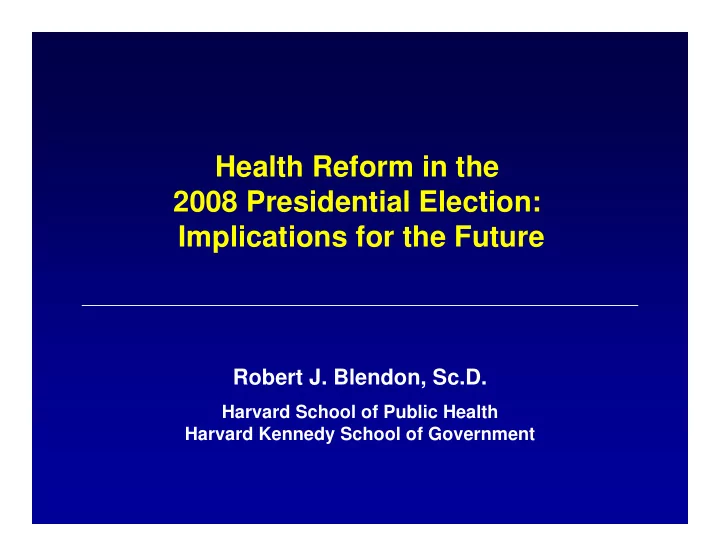

Health Reform in the 2008 Presidential Election: Implications for the Future Robert J. Blendon, Sc.D. Harvard School of Public Health Harvard Kennedy School of Government
Key Findings from the Election (1) • Health care second most important issue for Obama/ far below economy • Health care seen as an economic problem by Obama voters • Three-quarters of those picking health care voted for Obama • Very high expectations from Obama voters that something big could happen in health care
Key Points (2) Implications for Future • Supporters of Senators Obama and McCain differed greatly on views of future reform • Obama vs. McCain voters– • Placed higher priority on broader health reform • Favored more expansive role for federal government in changing system/expanding coverage • Favored more government regulation of health care/less emphasis on private sector/individual responsibility • Favored less restrained overall federal health spending • Favored tax increases for upper-income people • Vision of candidates/voters so disparate that in absence of one party control of Congress/Presidency, major reform hard to achieve • Economic crisis likely to have major consequences on future health debates
Most Important Issue Facing the Country Obama voters McCain voters 65% Economy 60% 13% Health care 5% 11% War in Iraq 8% 7% Energy policy 7% 2% Terrorism 17% National Exit Polls, November 2008.
Problems faced as a result of changes in economy % saying serious problem Paying for gas 38% Paying health care/insurance 33% Inadequate job income 30% Paying rent or mortgage 21% Paying for food 20% Losing money on stock market 19% Personal debt 18% Kaiser Family Foundation Health Tracking Poll, October 2008.
How Worried Are You about Being Able to Afford the Health Care Services You Need? Obama voters McCain voters 41% Very worried 24% 33% Somewhat worried 33% 18% Not very worried 28% Not at all 8% worried 15% National Exit Polls, November 2008.
Vote Distribution by Those Who Thought Health Care Most Important Issue (9% of total voters) Obama 73% McCain 26% Other 1% National Exit Polls, November 2008.
Will the Outcome of the Presidential Election Make a Great Deal of Difference on Various Top Issues? Obama voters McCain voters Iraq 62% 69% Economy 60% 54% Health Care 60% 40% Price of gas 29% 28% Harvard School of Public Health/Harris Interactive poll of Registered Voters, October 16-19, 2008.
Views of Obama vs. McCain Voters
Health Care Priorities for Next President Obama voters McCain voters Making health care/insurance more affordable 46% 44% Expanding health insurance coverage for uninsured 33% 10% Improving Medicare/Rx drug program 9% 14% Improving the quality of care and reducing medical errors 8% 15% Reducing spending on government health programs like Medicare and Medicaid 2% 13% Blendon et al, “Voters and Health Reform in the 2008 Presidential Election.” NEJM , November 6, 2008..
Views of Health Care System Obama voters McCain voters So much wrong with our health care system that it needs to be completely overhauled 28% 16% Some good things about our health system, but major changes are needed 55% 40% Works pretty well, but minor changes are needed 15% 39% Works well and does not need to be changed 1% 4% Blendon et al, “Voters and Health Reform in the 2008 Presidential Election.” NEJM , November 6, 2008..
Who Should Have the Most Responsibility for Helping to Ensure that Americans Receive Health Insurance Coverage Obama voters McCain voters Federal government 54% 20% Individuals themselves 18% 47% Employers and businesses 23% 30% Blendon et al, “Voters and Health Reform in the 2008 Presidential Election.” NEJM , November 6, 2008..
Preferred Health Insurance Coverage Policy Obama voters McCain voters Make major effort to provide health insurance to all/would involve substantial increase in spending 65% 26% Work to provide health insurance for some of the uninsured/would involve less new spending 26% 36% Keep things basically how they are 5% 31% Blendon et al, “Voters and Health Reform in the 2008 Presidential Election.” NEJM , November 6, 2008..
Importance to You that Health Care Proposal Not Raise Taxes Obama voters McCain voters Most important consideration 12% 23% Very important consideration 33% 47% Somewhat important 42% 26% Not important at all 13% 3% Blendon et al, “Voters and Health Reform in the 2008 Presidential Election.” NEJM , November 6, 2008..
Who Should Have the Most Responsibility for Slowing the Rise in Health Care Costs? Obama voters McCain voters Health insurance companies 36% 31% Doctors and hospitals 20% 27% The federal government 30% 15% Individuals themselves 6% 16% Employers and businesses 4% 5% Blendon et al, “Voters and Health Reform in the 2008 Presidential Election.” NEJM , November 6, 2008..
Priorities to Address Rising Health Costs Obama voters McCain voters Reducing the amount people pay for their health care and insurance 57% 44% Reducing what the nation as a whole spends on health care 21% 24% Reducing the amount employers pay to provide health insurance to their workers 9% 11% Reducing future spending on government health insurance programs like Medicare and Medicaid 6% 12% Blendon et al, “Voters and Health Reform in the 2008 Presidential Election.” NEJM , November 6, 2008..
Future Federal Spending on Health Care (% wanting spending increase) McCain voters Obama voters Medical care for veterans 70% 73% Programs to prevent disease and improve health 39% 67% Medicare 31% 49% Programs to protect against bioterrorism 41% 35% Biomedical research 24% 45% Medicaid 22% 42% Blendon et al, “Voters and Health Reform in the 2008 Presidential Election.” NEJM , November 6, 2008..
The Future
Public’s Views of Federal Regulation of Business 2008 2002 1986 28% Too much 30% 41% 43% 37% Too little 22% 16% 24% Right amount 22% “Don’t know” responses not shown CBS News polls, 1986, 2002, September 27-30, 2008.
Recommend
More recommend